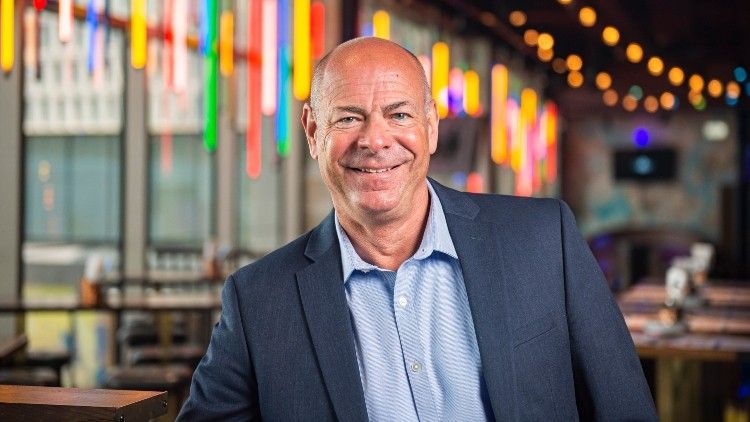Why reinvent the wheel when you’ve got the recipe for the secret sauce?
Joe Vrankin spent five years as CEO of Topgolf, where he learned what it means to deliver a winning entertainment experience. The key to victory in the competitive socializing space is what he calls the “triple threat:” game, food and drink, and guest satisfaction.
With some key members of Topgolf’s leadership team in tow, he now brings that triple threat to life at Puttshack, a tech-infused mini golf experience. Mini golf games are automatically scored by technology inside each golf ball. And the game itself isn’t your classic smorgasbord of pirate ships and windmills. Instead, guests can expect roulette, trivia, and beer pong along the way.
Add that to Puttshack’s appealing food and drink options, and you get an unforgettable night out. And the traction is there. Puttshack is growing in the U.S. and the U.K., where it got its start.
On an episode of the How I Raised It podcast, Joe breaks down the funding rounds for Puttshack, including a funding triple threat of sorts: private equity, family offices, and a senior debt raise. Plus, he details how the company raised while it wasn’t even operating during the pandemic.
The first raise: pre-pandemic crunch
Prior to Joe’s arrival at Puttshack, the company raised a small friends and family round. But once Joe joined Puttshack in 2019, it was time to do the venture raise. For proof of concept, Puttshack had one location open in West London. Potential investors could be flown to that location to get the full Puttshack experience and see whether the hype merited dollars.
Promethean Investments, a U.K. private equity firm, led the round. In fact, Puttshack was the first U.S.-based company it invested in. The round closed in January 2020 at $40 million, oversubscribed by $8 million.
Puttshack wasn’t concerned about raising too much too soon.
“Our view was a little bit different and strategically, when we laid out our plan, was to skip that kind of three year period of time seeing if this will work. I'm highly confident this is going to work,” Joe explains. “And rather than just raise enough money, let's raise more money than we typically would at the outset so that we can begin to open more and build a foundation because we're then going to be able to scale faster and smarter,” Joe says.
To grease the wheels, Puttshack had something that its competitors didn’t: an experienced leadership team.
“A lot of what they were investing in was not only the concept, but the team. How much confidence do I have that this team knows what they're doing? They've done it before, and therefore my risk as an early investor is reduced,” Joe explains.
The second raise
By the time Puttshack was ready for its Series A, the pandemic was in full swing. The company targeted $63 million for the raise, even though no Puttshack locations were operating because of pandemic precautions. However, there was some proof of concept from the U.K. locations.
“During the pandemic in the U.K., we had to shut down. When we reopened again, all of those venues were profitable after 72 hours,” Joe recalls.
Since it could demonstrate a path to profitability, Puttshack was able to hold its valuation and avoid a down round — while its competitors were losing valuations left and right. In May 2021, it announced a $60 million raise led by Promethean Investments, a private equity fund based in the UK.
Joe was drawn to Promethean instead of a typical VC firm because he felt the family-owned mid-market investment firm would take a long-term view. Venture capital firms tend to have a shorter term view, wanting an exit within five years.
“ [Private equity firms] tend to think multigenerational. How do I manage to grow these assets? They don't have the same timeframe you typically have with a venture capital fund — no I need to be out in 48 to 60 months,” he says.
And finally, debt
Puttshack started 2022 with the goal to secure senior debt, with a target of $150 million in funding.
In October 2022, Puttshack tapped BlackRock for its next round. Asset management firm BlackRock was an attractive partner, Joe notes, because it has no shortage of funding, with around $11 trillion under management. Additionally, BlackRock has connections to many other funding avenues — including venture, as well as private equity — which could be helpful later on.
And how did Joe make the connection to BlackRock? One of Puttshack’s private equity investors made the introduction. Puttshack is a good example of how each round builds on the one before it, with the network growing stronger each time.
In all, Joe and his team have raised around $250 million since he started with Puttshack in 2019.
Sage words: Don’t surround yourself with like-minded folk
The best advice isn’t always the easiest. When choosing your management team as a startup, it’s easy to surround yourself with like-minded people. But Joe wishes he’d known earlier to do the opposite.
“When growing a business, my advice is to surround yourself with people who are different than you and think differently than you. You're gonna get very different perspectives. That will help drive the best strategic solutions,” Joe shares.
He also encourages you to put the ego aside when disagreeing with those trusted advisors. You won’t always be right, and it’s okay to admit when you don’t know. While he couldn’t have known that without experience, Joe’s grateful to have learned those lessons.
“Wisdom is one of those things you get about 10 minutes after you really needed it because you just screwed something up,” he says.
Nathan is also the CEO of Fundingstack.com which is a new platform for VCs and investment bankers to both raise capital and assist clients and portfolio companies.
Users of these platforms have raised over $9.7 billion since 2016.
This article is based on an episode of Foundersuite’s How I Raised It podcast, a behind-the-scenes look at how startup founders raise money.


